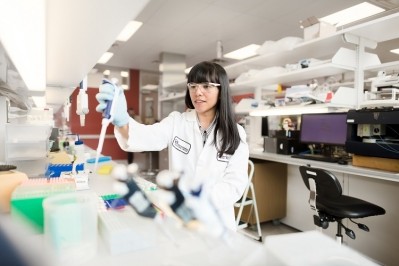Unilever focused on countering ‘dramatic’ input inflation amidst 9% 2021 net profit rise
![Unilever's CEO says that despite a successful year - with the fastest business growth reported in nine years - ongoing input inflation continues to be the company's biggest challenge [Getty Images]](/var/wrbm_gb_food_pharma/storage/images/_aliases/wrbm_large/publications/cosmetics/cosmeticsdesign-europe.com/headlines/business-financial/unilever-2021-full-year-net-profit-up-9-but-inflation-challenges-continue-says-ceo/13242523-1-eng-GB/Unilever-2021-full-year-net-profit-up-9-but-inflation-challenges-continue-says-CEO.jpg)
The European consumer goods giant totted up net sales of €13.1bn for the fourth quarter (Q4), up 4.9% on the previous year. Unilever’s largest division beauty and personal care – that it recently carved up as part of a wider company realignment – generated net sales of €5.8bn for the quarter, up 6.2% on the previous year. Within this division, Unilever’s prestige beauty unit performed particularly well, growing over 20% in 2021 to represent a €1bn business. Home care turnover grew 5% and foods and refreshment sales were up 3.2%.
For the full year of 2021, net sales sat at €52.4bn, up 3.4% on the previous year, with the fastest underlying sales growth reported in nine years at 4.5%. Full year net profit was €6.6bn, up 9% on 2020. Regionally, Asia, Africa, Middle East, Turkey, Russia, Ukraine and Balarus reported the biggest growth in net sales in 2021, up 5.8%, followed by the Americas region posting net sales growth of 5.5%. Net sales in Europe remained flat for the full year at 0.4% growth.
A ‘powerful, new organisation model’
Alan Jope, CEO of Unilever, said that whilst Unilever’s operating performance continued to accelerate, with the fastest business growth in nine years, it had not been an easy year.
“The major challenge of 2021 has been the dramatic rise of input costs,” Jope said.
Speaking to analysts on the company’s annual earnings call, he said the reorganisation of Unilever into five distinct divisions, announced earlier this month, would prove critical in securing future, long-term growth, in addition to continued brand investment and organic growth.
“A powerful, new organisation model will be a further accelerant. An operating model that moves away from a heavy matrix is simpler, more focused and provides greater accountability. It is designed for growth but does so at materially lower cost,” he said.
The reorganisation, set to be fully operational from July this year, was expected to generate around €600m in cost savings over two years, he said.
“…This new operating model is a major change in the way we run Unilever, and I firmly believe it’s one that will enable us to step up our growth by making us simpler, faster and more accountable.”
Referencing Unielver’s M&A goals, Jope said the potential acquisition of GSK Consumer Healthcare was now off the agenda, with no major acquisitions intended for the foreseeable future. Instead, Unilever would continue to look at “bolt-on acquisitions and selective disposals”, he said.
‘Biggest challenge’ will continue to be input cost inflation
Moving forward, the CEO said the biggest challenge for Unilever in maintaining its growth momentum would be “navigating a further step-up in input cost inflation” –
The company had already hiked prices in a “heavily inflationary environment” throughout 2021, which was working, he said, but it would continue to focus on accelerating growth in the context of ongoing inflation because there was certainly “more to do”.
Unilever was expecting a “very high input cost inflation” in the first half of 2022 – over €2bn – though this was expected to moderate in the second half of the year to around €1.5bn, Jope said.
“In 2022, we will manage a significant input cost inflation cycle and will continue to invest competitively in marketing, R&D and capital expenditure.”
Expected underlying sales growth for 2022, he said, was expected to sit between 4.5% and 6.5%.
The Consumer Analyst View
Price hikes may push beauty consumers away
Nina Nowak, senior researcher at GlobalData, said that whilst Unilever had performed well in “rocky conditions”, its indications of further price rises could “dampen the company’s future growth ambitions”.
“According to GlobalData’s Q4 2021 consumer survey, products from global brands dominate the market, as approximately half of consumers globally typically prefer beauty and grooming and household care products from multinational companies,” Nowak said.
“However, as 32% of people continue to feel extreme financial pressure, further price rises may encourage them to trade down for more affordable private label alternatives.”
Moving forward, she said Unilever had to focus on continuing to build its portfolio, particularly in terms of “adding value” to retain price-squeezed customers.
![Unilever's freshly carved-out beauty and wellbeing division, with Dove, Vaseline and Sunsilk key brands, reported strongest full-year growth [Getty Images]](/var/wrbm_gb_food_pharma/storage/images/_aliases/wrbm_medium/publications/cosmetics/cosmeticsdesign-europe.com/article/2023/02/10/unilever-full-year-2022-net-profit-soars-24.9-with-beauty-and-wellbeing-growing-strongest/16159340-1-eng-GB/Unilever-full-year-2022-net-profit-soars-24.9-with-beauty-and-wellbeing-growing-strongest.jpg)
![Unilever has been in global negotiations with retailer partners worldwide on tackling high inflation with price hikes [Getty Images]](/var/wrbm_gb_food_pharma/storage/images/_aliases/wrbm_medium/publications/cosmetics/cosmeticsdesign-europe.com/article/2022/07/27/unilever-q2-h1-financial-results-grow-despite-serious-inflation-pressures/15633027-1-eng-GB/Unilever-Q2-H1-financial-results-grow-despite-serious-inflation-pressures.jpg)

![Hair care continues to boom and consumers have newfound interest in better understanding their hair type and needs on a personalised level [Getty Images]](/var/wrbm_gb_food_pharma/storage/images/_aliases/wrbm_medium/publications/cosmetics/cosmeticsdesign-europe.com/article/2022/04/27/unilever-living-proof-and-revieve-launch-ai-hair-care-advisor-tool-to-boost-hair-science/15364077-1-eng-GB/Unilever-Living-Proof-and-Revieve-launch-AI-hair-care-advisor-tool-to-boost-hair-science.jpg)
















